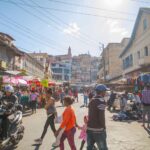On September 11, the International Monetary Fund (IMF) warned that Madagascar was living beyond its means. Grappling with major shocks clouding the economy, the country’s spending was far beyond its tax collections.
Two weeks later, the Indian Ocean island nation of 31.9 million people exploded. The youths, hopeless due to hardships including severe water, electricity shortages, poverty, and corruption, ignited protests that led to the ouster and fleeing to exile of President Andry Rajoelina.
Col Michael Randrianirina, who led an elite army unit to join the protests in an unprecedented move, has been sworn in as president.
“From now on, we will restore the country to its former glory, fight against insecurity, and gradually try to solve the social problems that Malagasy people experience,” he said soon after taking office.
For Randrianirina, who has appointed a private sector guru with “relations with international organizations” as prime minister, addressing Madagascar’s socio-economic challenges will be a tall order.
With a gross domestic product of $19.3 billion and a per capita income of $545, poverty is deeply entrenched. A whole 75% of the population lives on less than $3 a day, while only 36% have access to erratic electricity.
Apart from youth unemployment being high, in excess of 30% in urban areas, corruption is also endemic. In 2024, it ranked 142 out of 180 countries in the Transparency International corruption index.
The economy is also taking a beating. A case in point is the critical, and underperforming, mining sector that contributes 4.5% to GDP. Madagascar is a major producer of graphite, cobalt, and nickel. The US, for instance, imports 4% of graphite from the country, the world’s second-largest producer.
Slapped with a 15% tariff by the Trump administration, the textile and apparel industry that employs over 400,000 is facing an uncertain future. Exports to the US reached $733 million in 2024. With the IMF revising growth projections for 2025 downwards to 4% from 4.6%, the reality is that Randrianirina faces a herculean task. The burden is made heavier by lack of support from top organizations. The African Union and the United Nations both condemned the regime change.







